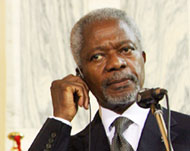Iran set for a showdown at UN
Iran appears to be heading for a showdown at the UN Security Council next week over its nuclear programme, facing the threat of sanctions after refusing to freeze sensitive fuel cycle work.

Western nations reacted coolly to Iran‘s response to an offer by the five permanent Security Council members and Germany of incentives in return for a halt to uranium enrichment.
Iran‘s approach was based on “removal of the other side’s concerns along with preservation of Iran‘s rights”, Ali Larijani, chief Iranian negotiator, was quoted as saying by official media on Thursday.
IRNA, Iran’s official news agency, quoted Larijani as saying: “We have responded to all the important issues proposed in the package with a serious and just attitude, including Iran’s duties and rights under the NPT” or nuclear Non-Proliferation Treaty to which Tehran has adhered.
“We are ready to reach an understanding in constructive and serious talks.
“Considering the critical conditions of the region, Iran is ready to help with stable peace in the region under a just mechanism.”
Short-term suspension?
Gholamhossein Elham , the Iranian government spokesman, declined on Wednesday to say whether Iran might accept a short-term suspension of its nuclear programme.
“Nothing has changed. We will continue our research activities, but we want understanding and dialogue,” he said.
The Islamic republic has also been flexing its military might during nationwide war games it says demonstrate it can respond to “any threat”.
|
“Nothing has changed. We will continue our research activities, but we want understanding and dialogue” Gholamhossein Elham, |
The US has already said that the initial Iranian response fell short of UN demands. While Germany described it as unsatisfactory, France insisted that Tehran immediately suspend nuclear activities.
In contrast, China and Russia have appealed for a peaceful solution to the standoff. Russia, which is building Iran‘s first nuclear power plant at Bushehr, said it would continue to press for a political solution and wanted to keep the UN nuclear watchdog – not the Security Council – at the centre of the process.
Sun Bigan, China‘s special envoy to the Middle East, said Beijing sought a “peaceful settlement rather than resorting to force or threatening sanctions”.
Resolution
The Security Council adopted a resolution last month giving Iran until August 31 to freeze its uranium enrichment programme or face sanctions.
The US and other powers suspect that the nuclear programme is a smokescreen for an attempt to produce a bomb.
Enrichment can make fuel for nuclear power stations or be extended to create the core of atomic weapons.
 |
|
Kofi Annan is expected to travel to |
However, Iran, the world’s fourth-largest oil producer, insists that it is purely for peaceful power generation and that it has the right to the technology as an NPT signatory.
Meanwhile, in Paris, an Iranian opposition group announced that Tehran had assembled and is testing 15 so-called P2 centrifuges, which could speed up enrichment.
Mohammad Mohadessin, of the National Council of Resistance of Iran, told a press conference that the test site was off a main road northeast of Tehran.
Kofi Annan, the UN secretary-general, was expected to travel to Tehran next week.
As the Security Council deadline neared, International Atomic Energy Agency inspectors were in the final stages of preparing a report on Iran‘s uranium enrichment work.
Mohamed ElBaradei ,IAEA chief , is to report back to the Security Council on Iran‘s compliance and if it is deemed to have failed, the Council will consider adopting “appropriate measures” under Article 41 of Chapter Seven of the UN Charter, which sets out enforcement powers.